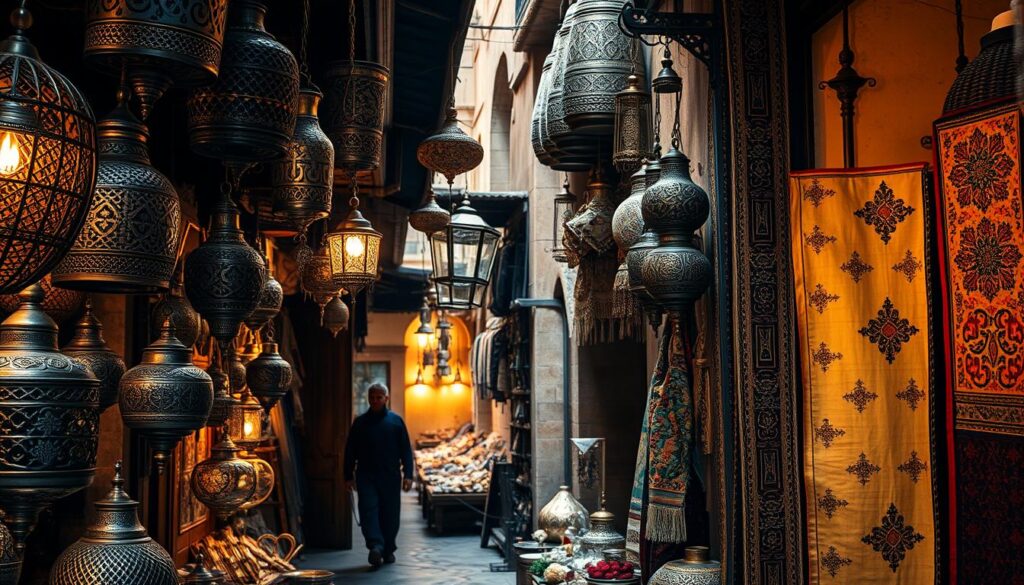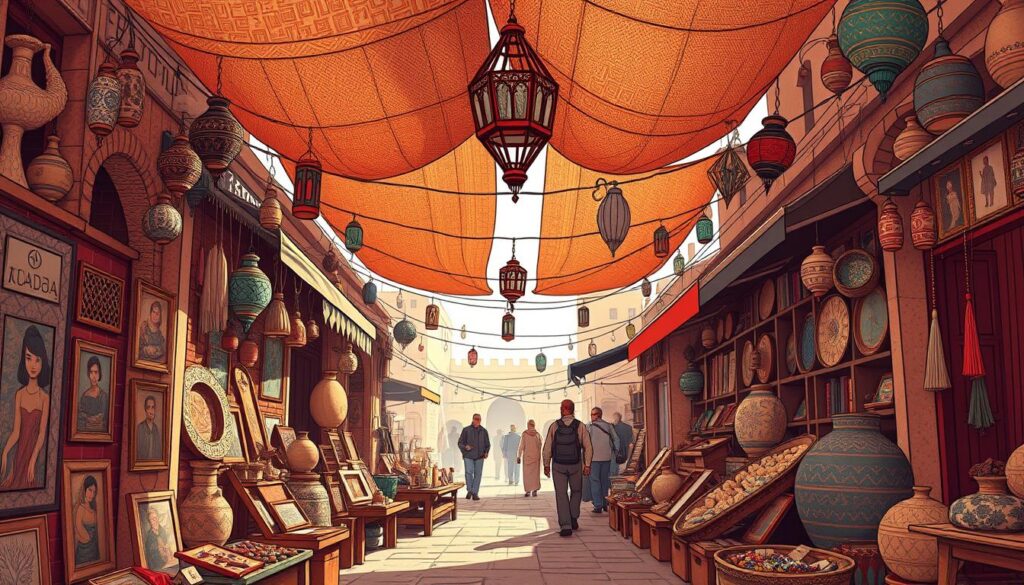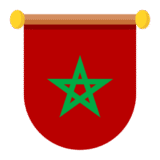Moroccan Art and Crafts Markets to Visit in 2025
Did you know that craftsmanship is a vital part of Morocco’s heritage, reflecting its rich cultural and historical background? We are excited to guide you through the vibrant world of arts and crafts markets in Morocco, where centuries-old traditions come alive in a kaleidoscope of colours, textures, and designs.
Morocco’s rich cultural heritage is beautifully preserved in its handicraft traditions, making these markets essential destinations for anyone wanting to experience authentic Moroccan art. From the bustling souks of Marrakech to the ancient medinas of Fez, you’ll discover exquisite handcrafted treasures that showcase remarkable craftsmanship.
The Rich Heritage of Moroccan Craftsmanship
As we explore the world of Moroccan arts and crafts, we uncover a treasure trove of cultural heritage. Moroccan craftsmanship is a reflection of the country’s diverse history and cultural influences.
The Cultural Significance of Moroccan Arts and Crafts
Moroccan arts and crafts are more than just beautiful objects; they embody the country’s rich history and diverse cultural influences, from Berber traditions to Arabic, Andalusian, and African heritage. Understanding the cultural significance of these crafts is essential to appreciating the treasures you’ll discover in the markets. These crafts play a vital role in Moroccan culture, serving not just as decorative items but as expressions of regional identity and family tradition.
Natural Materials and Traditional Techniques
The simplicity of Moroccan craftsmanship is largely due to the reliance on natural materials such as animal skin, wool, wood, silk, and clay. Craftsmen transform these simple elements into extraordinary works of art using traditional techniques that have been preserved for centuries. The use of these materials and techniques varies across different regions, reflecting the unique cultural heritage of each area. What makes Moroccan craftsmanship particularly special is its balance of practical utility with artistic expression.
Must-Visit Moroccan Art and Crafts Markets
Morocco’s art and crafts markets are a treasure trove of cultural richness and diversity. We recommend visiting these markets to experience the authentic Moroccan art and craftsmanship.
Ensemble Artisanal Marrakech
Located close to the main Jemaa el-Fnaa square, Ensemble Artisanal Marrakech is a must-visit destination for anyone new to Moroccan art markets. This complex features a variety of shops and an open working area where artisans create beautiful pieces.
We always recommend Ensemble Artisanal Marrakech as a perfect starting point, offering a relaxed shopping environment with fixed prices and no pressure to buy.
The Souks of Fez Medina

The souks of Fez Medina provide one of the most authentic market experiences in Morocco, with the ancient medina housing specialised markets where you can find everything from intricate metalwork to fine embroidery.
Fez’s craft markets maintain some of the most traditional production methods in the country, making them a must-visit for anyone interested in authentic Moroccan art.
Rabat’s Craft Markets

Rabat’s craft markets offer a less touristy alternative, allowing visitors to discover high-quality Moroccan art in a more relaxed atmosphere compared to the busier markets of Marrakech.
What makes these markets special is not just the products but the opportunity to connect with local artisans and learn about their craft directly from the source.
Treasures to Discover in Moroccan Markets
As we explore the vibrant markets of Morocco, we uncover a treasure trove of artisanal crafts that reflect the country’s rich cultural heritage. The souks are a testament to the skill and creativity of Moroccan artisans, offering a diverse range of unique items that make for memorable souvenirs or decorative pieces.
Traditional Carpets and Textiles
Moroccan carpets and textiles are highly prized for their intricate designs and the stories they tell through their patterns. Traditionally handmade by women using techniques passed down through generations, these pieces are not only beautiful but also carry significant cultural value. Amazigh rugs, in particular, are renowned for their unique geometric patterns.
Leather Goods and Babouche Shoes
Moroccan leather goods are celebrated worldwide for their quality and craftsmanship. The tanneries of Fez and Marrakech produce an array of luxurious items, from bags to the iconic babouche shoes, available in a variety of colours. These leather goods make for practical and stylish souvenirs.
Zellige Mosaics and Ceramics
The art of zellige, or mosaic tile making, is a hallmark of Moroccan decorative arts, with Fez being its main hub. Zellige mosaics and ceramics showcase the precision and artistic vision that have made Moroccan crafts famous globally. These pieces are not only decorative but also reflect the mathematical precision and beauty of Moroccan artistry.
Jewellery and Metalwork
Moroccan jewellery traditions vary significantly across regions, from the intricate gold filigree of Fez to the bold silver and stone designs characteristic of Berber jewellery. Metalwork, too, is a notable craft, with artisans creating beautiful pieces that range from functional items to decorative wall hangings.
| Craft | Region | Description |
|---|---|---|
| Carpets and Textiles | Various | Intricately designed, traditionally handmade by women, featuring unique regional patterns. |
| Leather Goods | Fez, Marrakech | Luxurious bags, babouche shoes, and other items showcasing exceptional craftsmanship. |
| Zellige Mosaics and Ceramics | Fez | Precision-crafted mosaic tiles and ceramics reflecting Moroccan artistic vision. |
| Jewellery and Metalwork | Various | Regional variations in jewellery, from gold filigree to silver and stone designs, alongside decorative metalwork. |
Regional Specialties and Where to Find Them
As we journey through Morocco, we discover that each city boasts its own unique arts and crafts traditions. The country’s rich cultural heritage is reflected in the diverse range of artisanal specialties found across its cities.
Fez: The Home of Zellige and Fine Embroidery
Fez stands as the undisputed world capital of zellige mosaic work, where artisans create breathtakingly complex geometric patterns. The city’s craft heritage also includes some of the finest embroidery in Morocco, reflecting the sophisticated urban culture of this ancient imperial city.
Marrakech: Leather and Woodwork
Marrakech has earned its reputation as the centre for Morocco’s finest leather craftsmanship, with its tanneries producing supple, dyed leathers. We particularly love Marrakech’s woodworking traditions, where cedar and thuya wood are carved and inlaid to create furniture and decorative items that showcase extraordinary craftsmanship.
Tiznit: Berber Silver Jewellery
Tiznit, in southern Morocco, is the heart of Berber silver jewellery production, where artisans create distinctive pieces that combine silver with amber, coral, and semi-precious stones. The jewellery from this region tells stories of Berber culture through its symbolic designs.
These regional specialties represent authentic artistic traditions that have developed in response to local materials, cultural influences, and historical circumstances, making them truly worth seeking out.
Shopping Tips for Moroccan Craft Markets
As you navigate the vibrant souks and artisanal shops of Morocco, keeping a few insider tips in mind can greatly enhance your shopping experience. Starting at fixed-price establishments like Ensemble Artisanal is a great way to understand fair prices before venturing into traditional souks where bargaining is expected.
When shopping for traditional Moroccan pottery, carpets, or mosaic work, take time to observe artisans at work. This not only enhances your appreciation but also helps you distinguish quality craftsmanship. Bargaining is part of the culture, but approach it as a friendly conversation, aiming for a fair price for both you and the artisan.
To make the most of your visit, learn a few basic Arabic or Berber phrases, which can lead to better prices and more authentic experiences. Remember, supporting local artisans preserves traditional craft techniques and cultural heritage. The most meaningful souvenirs are those with stories, so take time to learn about the history and cultural significance of the crafts you’re purchasing.

